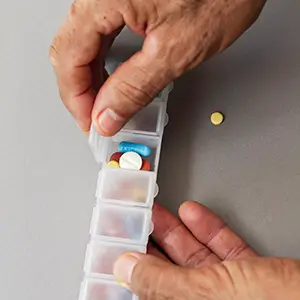In “Overcoming Prostate Issues: How a Japanese Breakfast Ritual Changed My Life,” Jeff Simmons, a medical recruiter, shares his personal journey of battling prostate issues that significantly impacted his life and marriage. Struggling with difficulties in using the bathroom and experiencing decreased sexual performance, Jeff felt isolated, frustrated, and hopeless. After trying various treatments without success, he stumbled upon a Japanese breakfast ritual that transformed his life in a matter of weeks. This safe and simple ritual not only resolved his prostate issues, but also improved urine flow, bladder control, sex drive, stamina, and sleep quality. With the goal of empowering other men to take control of their prostate health and stop relying on ineffective treatments, Jeff invites readers to discover the life-changing potential of this ritual.

Prostate Health
Prostate health is a fundamental aspect of overall well-being for men. The prostate is a small gland located beneath the bladder and surrounding the urethra. Its main function is to produce fluid that nourishes and protects sperm. Maintaining prostate health is crucial to prevent the development of various conditions that can significantly impact a man’s quality of life.
Importance of maintaining prostate health
Maintaining prostate health is essential for several reasons. A healthy prostate is crucial for proper urinary function, including the flow of urine and bladder control. Prostate problems can lead to troublesome symptoms such as frequent urination, difficulty initiating urination, weak urine flow, and incomplete emptying of the bladder. By prioritizing prostate health, you can reduce the risk of these issues and maintain optimal urinary function.
Another key reason to focus on prostate health is its impact on sexual function. The prostate plays a vital role in ejaculation, and any disruption or dysfunction can lead to sexual problems such as erectile dysfunction or decreased libido. By taking care of your prostate, you can promote healthy sexual function and enhance your intimate relationships.
Common prostate health issues
Several common prostate problems can arise, affecting men of various age groups. One of the most common conditions is benign prostatic hyperplasia (BPH), which refers to the enlargement of the prostate gland. BPH can cause urinary symptoms like frequent urination, nocturia (waking up frequently at night to urinate), and urgency.
Prostatitis is another prevalent issue, referring to the inflammation of the prostate. It can cause pain and discomfort in the pelvic region, frequent urination, and painful urination. Prostate cancer is also a concern, albeit less common than other prostate problems. Regular screening for prostate cancer, especially in older men, is crucial for early detection and intervention.
Different types of prostate problems
Prostate problems can manifest in various forms, each with its own set of symptoms and treatment approaches. BPH, as mentioned earlier, is characterized by the non-cancerous enlargement of the prostate gland. This condition can lead to urinary symptoms and the need for frequent bathroom visits.
Prostatitis, on the other hand, involves inflammation of the prostate, which can be caused by infection or other factors. It can result in pelvic pain, urinary difficulties, and discomfort during ejaculation. Prostate cancer is the most serious prostate problem, and its symptoms can include urinary changes, blood in the urine or semen, and erectile dysfunction.

Causes of prostate problems
The causes of prostate problems can vary depending on the specific condition. BPH is believed to be primarily influenced by age and hormonal changes, particularly the conversion of testosterone to dihydrotestosterone (DHT). Genetic factors and family history may also contribute to the development of BPH.
Prostatitis is often caused by bacterial infection, although nonbacterial prostatitis can occur as well. Infections can enter the prostate through the urethra or spread from other parts of the body. Risk factors for prostatitis include urinary tract infections, recent medical procedures involving the urinary tract, and a weakened immune system.
Though the exact causes of prostate cancer are still unknown, risk factors include age, family history, race, and certain genetic mutations. High levels of testosterone and increased exposure to certain environmental factors may also contribute to the development of prostate cancer.
Symptoms of prostate problems
Depending on the specific prostate problem, symptoms can vary. BPH commonly presents with urinary symptoms such as frequent urination, increased urgency, weak urinary stream, and the sensation of incomplete bladder emptying. In severe cases, BPH can lead to urinary retention, where you are unable to urinate at all.
Prostatitis may cause painful urination, difficulty emptying the bladder, pelvic pain, discomfort during ejaculation, and flu-like symptoms such as fever and chills. Prostate cancer symptoms can be similar to those of BPH, but may also include blood in the urine or semen, erectile dysfunction, and bone pain.
It is important to note that some prostate problems may not present with any symptoms in the early stages. Regular check-ups and screenings can help detect these issues before they progress and cause significant discomfort or complications.
Impact of prostate problems on quality of life
Prostate problems can significantly impact a man’s quality of life. Symptoms such as frequent urination, urgency, and discomfort can disrupt daily activities and affect productivity. The need for frequent bathroom visits, especially at night, can result in sleep disturbances and fatigue, leading to decreased energy levels and difficulties concentrating.
Psychologically, prostate problems can take a toll on mental well-being. The frustration and inconvenience caused by urinary symptoms can lead to irritability and mood swings. The fear of embarrassment or leakage can also cause anxiety and reduced self-confidence. Additionally, sexual problems related to prostate issues can lead to feelings of inadequacy and decreased intimacy in relationships.
Psychological effects of prostate problems
Prostate problems can have a significant psychological impact on affected individuals. The frustration and stress of dealing with urinary symptoms and sexual dysfunction can lead to feelings of helplessness and decreased self-esteem. Men may feel embarrassed or ashamed, especially if their symptoms are noticeable, causing them to withdraw from social activities and limit their interactions with others.
Depression and anxiety are common psychological consequences of prostate problems. The constant worry about managing symptoms and the negative impact on daily life can lead to increased levels of stress and feelings of isolation. Seeking emotional support and engaging in activities that promote mental well-being can be important aspects of coping with the psychological effects of prostate problems.

Effects on relationships and intimacy
Prostate problems can also have a significant impact on relationships and intimacy. The physical symptoms, such as urinary difficulties and sexual dysfunction, can affect the sexual experience and lead to frustration for both partners. Reduced sexual desire and the inability to perform sexually can create tension and strain the emotional connection within a relationship.
Communication is key when facing these challenges. Openly discussing the impact of prostate problems on intimacy and exploring alternative ways to express affection can help maintain a strong emotional bond. Seeking professional guidance, such as couples therapy or sex therapy, can also provide valuable support and guidance in navigating the challenges associated with prostate problems.
Empowering individuals to overcome prostate problems
Overcoming prostate problems requires empowerment and an active approach to managing one’s health. It is important to gather information, seek advice from medical professionals, and take an active role in decision-making regarding treatment and lifestyle changes. By adopting a proactive mindset and embracing the fact that you have the power to improve your prostate health, you can regain control over your well-being.
Taking charge of your prostate health
Taking charge of your prostate health begins with adopting healthy lifestyle habits. Regular exercise, maintaining a balanced diet, and managing stress can positively influence prostate health. Incorporating foods rich in antioxidants, such as tomatoes, green tea, and berries, can provide potential benefits for prostate health. Avoiding excessive alcohol consumption and staying hydrated are also important steps in maintaining a healthy prostate.
Regular check-ups and consultations with a healthcare professional are essential for early detection and effective management of any prostate issues. Through regular screenings and discussions with your doctor, you can stay informed about your prostate health and address any concerns or symptoms promptly.
Overcoming the stigma of prostate issues
One significant challenge in addressing prostate problems is the stigma surrounding discussions related to urinary and sexual health. Many men may feel reluctant or embarrassed to seek professional help, often resulting in delayed diagnosis and treatment. It is important to break down these barriers and create a supportive environment where men feel comfortable discussing their concerns and seeking the necessary help.
Education and raising awareness about prostate health can play a pivotal role in breaking the stigma and encouraging open conversations. Providing accurate and accessible information about prostate problems and emphasizing that seeking help is a sign of strength can help individuals overcome the fear of judgment and take proactive steps towards managing their prostate health.

Explanation of prostate parasites metaphorically
The term “prostate parasite” is used metaphorically to represent the problems that can plague the prostate gland. While not scientifically accurate for all prostate issues, the metaphor highlights the detrimental nature of the conditions that impact the prostate. These issues can attack and irritate the prostate gland, leading to swelling and disruption of urinary function.
This metaphor underscores the importance of understanding the root causes of prostate problems and addressing them effectively. By eliminating these metaphorical “parasites,” we can alleviate symptoms and promote optimal prostate health.
How prostate parasites affect urinary function
The metaphorical “prostate parasites” can disrupt urinary function in several ways. They can cause inflammation within the prostate gland, leading to an enlarged prostate and compression of the urethra. This compression restricts the flow of urine, resulting in weak urine flow, incomplete bladder emptying, and frequent urination.
Furthermore, these metaphorical parasites can irritate the lining of the prostate and the entire urinary tract, leading to increased sensitivity and discomfort during urination. By targeting and eliminating these “parasites,” we can restore normal urinary function and alleviate the bothersome symptoms associated with prostate problems.
Addressing the root cause of prostate problems
Addressing the root cause of prostate problems is crucial for effective management and long-term improvement in prostate health. While pharmaceutical solutions may provide temporary relief from symptoms, they often come with potential side effects and do not tackle the underlying cause of the issue.
Exploring alternative approaches that target the root cause can offer a more holistic and sustainable solution. The Japanese breakfast ritual, discovered by Jeff Simmons, offers a safe and simple method to address prostate issues. This ritual focuses on eliminating metaphorical parasites that irritate the prostate, allowing for improved urinary function, better sleep, and enhanced sexual health.
Lifestyle changes to prevent worsening of prostate conditions
Making certain lifestyle changes can play a significant role in preventing the worsening of prostate conditions. Regular exercise is beneficial for overall health, including prostate health. Engaging in physical activities such as walking, jogging, or cycling can help improve blood circulation to the prostate and reduce the risk of developing prostate problems.
Dietary choices can also impact prostate health. Incorporating a variety of fruits, vegetables, whole grains, and lean proteins into your diet can provide essential nutrients and antioxidants that support a healthy prostate. Limiting the consumption of processed foods, red meat, and high-fat dairy products is recommended as they may potentially contribute to the development of prostate problems.

Dietary recommendations for prostate health
When it comes to prostate health, specific dietary recommendations can be beneficial. Including foods rich in antioxidants, such as tomatoes, broccoli, and berries, can provide potential protection against cellular damage and inflammation. Green tea, soy, and omega-3 fatty acids found in fish like salmon can also contribute to prostate health.
Additionally, maintaining an adequate intake of water is essential for overall prostate health. Staying hydrated helps flush out toxins and waste products from the body, promoting optimal urinary function and reducing the risk of urinary tract infections.
Exercise and stress management strategies
Regular exercise is not only crucial for physical well-being but can also positively impact prostate health. Engaging in activities like jogging, swimming, or weightlifting helps improve blood flow to the prostate and supports overall prostate health. Maintaining a consistent exercise routine can have a positive effect on urinary and sexual function.
Stress management is another important aspect of prostate health. Chronic stress can weaken the immune system and potentially contribute to prostate problems. Exploring stress-reducing techniques such as meditation, deep breathing exercises, and hobbies can help alleviate stress and promote overall well-being.
Managing common symptoms associated with prostate problems
Prostate problems can cause a variety of symptoms that can significantly impact daily life. While individual experiences may vary, certain strategies can help manage common symptoms effectively. For example, practicing pelvic floor exercises, also known as Kegel exercises, can help strengthen the muscles surrounding the prostate and improve urinary control.
Making adjustments to fluid intake, especially in the evening, can help manage nocturia (frequent nighttime urination). Limiting caffeine and alcohol consumption and reducing fluid intake a few hours before bedtime can help reduce nighttime bathroom visits. It is also important to empty the bladder completely before going to bed to minimize the need for nighttime urination.
Natural remedies for symptom relief
Aside from lifestyle changes, various natural remedies can offer relief from prostate-related symptoms. Herbal supplements like saw palmetto and pygeum africanum have been traditionally used to alleviate urinary symptoms associated with BPH. However, it is essential to consult with a healthcare professional before starting any new supplements to ensure safety and efficacy.
Prostate massage, when performed by a trained professional, can also provide relief by promoting blood circulation and prostate health. It is important to note that prostate massage should be carried out by a healthcare professional or under their supervision to prevent complications.
When to seek medical intervention
While lifestyle changes and natural remedies can be effective in managing prostate problems, there are instances where medical intervention is necessary. It is crucial to seek medical attention if you experience persistent or worsening symptoms that significantly impact your quality of life.
Additionally, if you notice any concerning changes such as blood in the urine or semen, sudden and unexplained weight loss, or new-onset erectile dysfunction, it is important to consult with a healthcare professional promptly. Timely medical intervention can help identify the underlying cause and provide appropriate treatment options tailored to your specific condition.
How prostate problems affect sleep quality
Prostate problems can have a direct impact on sleep quality. Nocturia, a common symptom of prostate conditions, refers to the need to urinate frequently during the night, disrupting sleep patterns. Waking up multiple times to use the bathroom can lead to sleep fragmentation, leaving you feeling tired and less rested.
Additionally, discomfort or pain associated with certain prostate problems, such as prostatitis or an enlarged prostate, can make it challenging to find a comfortable sleep position. This discomfort further disrupts sleep and can cause nighttime restlessness.
Tips for improving sleep with prostate issues
Despite the challenges posed by prostate problems, there are strategies that can help improve sleep quality. Establishing a regular sleep schedule, aiming for seven to eight hours of sleep per night, can promote healthier sleep patterns. Creating a comfortable sleep environment, such as using supportive pillows or investing in a high-quality mattress, can also enhance sleep quality.
Managing fluid intake in the evening, as previously mentioned, can help reduce nighttime urination frequency. Additionally, practicing relaxation techniques before bed, such as deep breathing exercises or gentle stretching, can promote a sense of calm and help prepare the body for sleep.
The impact of sleep on overall prostate health
Quality sleep is essential for overall prostate health. During sleep, the body repairs and rejuvenates itself, and this includes the prostate gland. Adequate rest supports cellular regeneration and contributes to the overall well-being of the prostate.
Conversely, sleep disturbances caused by prostate problems can exacerbate symptoms and potentially lead to increased inflammation and discomfort. By prioritizing and improving sleep quality, you can positively influence your prostate health and enhance your overall well-being.
The connection between prostate health and sexual function
Prostate health and sexual function are closely connected. The prostate gland plays a crucial role in ejaculation, producing the fluid that carries and nourishes sperm. Any disruptions or dysfunctions in the prostate can have a direct impact on sexual performance and satisfaction.
Prostate problems like BPH or prostatitis can lead to sexual difficulties such as erectile dysfunction, decreased libido, or discomfort during ejaculation. By addressing and managing these prostate issues, you can improve sexual function and enhance your overall sexual health.
Strategies for managing sexual issues related to prostate problems
Managing sexual issues related to prostate problems requires a multi-faceted approach. Open communication with your partner is crucial to fostering understanding and creating a supportive environment. Discussing concerns, desires, and exploring alternative methods of intimacy can help maintain a healthy sexual relationship.
Working with a healthcare professional specializing in sexual health can provide valuable guidance and interventions tailored to your specific needs. They may recommend treatments such as medication, hormone therapy, or devices to address erectile dysfunction or other sexual difficulties associated with prostate problems.
Enhancing sexual health through prostate health maintenance
Maintaining prostate health is key to enhancing sexual health. Incorporating lifestyle changes such as regular exercise, a healthy diet, and stress management can positively influence both prostate health and sexual function. Prioritizing overall well-being and maintaining a proactive approach to prostate care can contribute to improved sexual satisfaction and performance.
Information on support groups for individuals and families
Support groups can be invaluable resources for individuals and families affected by prostate problems. These groups provide a space for individuals to share their experiences, receive emotional support, and learn from others facing similar challenges. Connecting with individuals who have firsthand experience with prostate issues can provide insight, guidance, and a sense of community.
Local hospitals, clinics, and community centers often offer support groups specifically tailored for prostate-related concerns. Online platforms, including dedicated forums and social media groups, can also provide a virtual space for individuals to connect and seek support from the comfort of their own homes.
Online resources and forums for prostate health
The internet offers a wealth of online resources and forums dedicated to prostate health. These platforms provide access to valuable information, including articles, expert opinions, and research updates. Online forums serve as a space for individuals to ask questions, share experiences, and learn from others navigating similar circumstances.
Reliable sources such as reputable medical websites, nonprofit organizations, and educational platforms can provide accurate and up-to-date information on prostate health. It is essential to be cautious and verify the credibility of online resources before relying on the information provided.
Connecting with others facing similar challenges
Connecting with others facing similar challenges can provide a sense of validation, understanding, and support. Whether through in-person support groups or online communities, sharing experiences and insights can help individuals feel less isolated and more empowered in managing their prostate health.
Building connections with others can also create a network of support, offering opportunities to exchange advice and recommendations for healthcare professionals, treatments, and lifestyle changes. Remember, you are not alone in your prostate health journey, and reaching out to others can be a valuable step towards regaining control over your well-being.
In conclusion, maintaining prostate health is crucial for overall well-being, urinary function, and sexual satisfaction. By understanding the common prostate problems, their causes, and symptoms, individuals can take an active role in preventing and managing these issues. By addressing the root cause of prostate problems, making lifestyle changes, seeking medical intervention when necessary, individuals can regain control over their prostate health, improve their quality of life, and enhance their overall well-being. Additionally, accessing support groups and online resources can offer valuable emotional support and information to individuals and families facing prostate-related challenges. Remember, you have the power to prioritize your prostate health and take steps towards a healthier, happier life.




